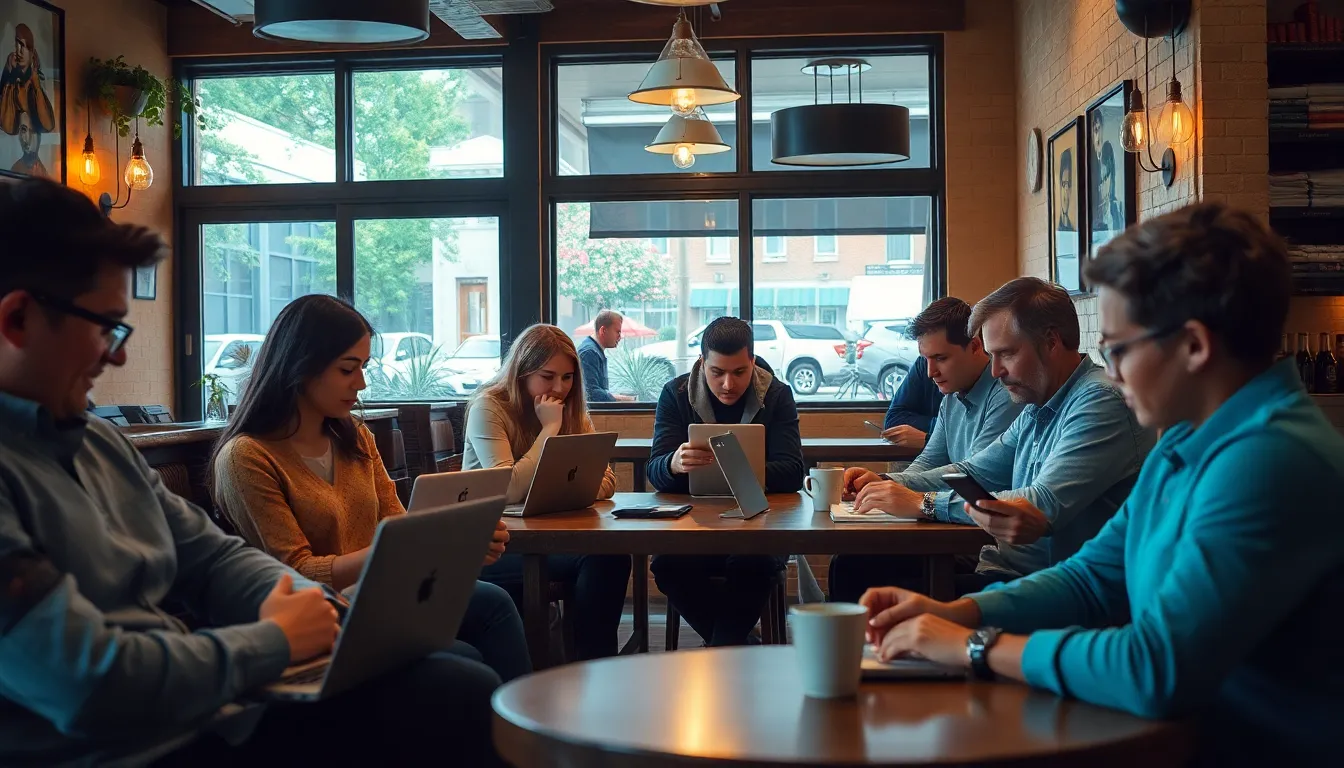In today’s digital jungle, surfing the web without a VPN is like walking a tightrope without a safety net. One wrong step and you could find yourself tangled in a web of hackers, snoopers, and those pesky geo-restrictions. But fear not! Setting up a VPN is easier than finding a cat video on the internet.
Table of Contents
ToggleWhat Is a VPN?
A VPN, or Virtual Private Network, enhances online privacy and security. This technology creates a secure connection between a user’s device and the internet. Browsers often expose personal data, making VPNs essential for safeguarding sensitive information.
Users can mask their IP addresses, which prevents tracking by websites and advertisers. Through encryption, VPNs protect data from interception by hackers. Many individuals utilize VPNs to access content that’s restricted by geographic location, ensuring unrestricted internet access.
Businesses frequently rely on VPNs to support remote work while maintaining cybersecurity. Remote employees can access company resources securely, minimizing the risk of data breaches. Various VPN protocols ensure robust encryption, such as OpenVPN and IKEv2, catering to diverse user needs.
Establishing a VPN connection typically involves choosing a reputable provider, downloading the application, and configuring settings. Specific features, like multiple server locations and no-logs policies, are crucial factors when selecting a VPN service. Many providers offer free trials, allowing users to evaluate effectiveness before committing.
Practicing with a VPN enhances online experiences, from streaming to browsing securely. Technological advancements continue to improve the functionality of VPNs, making them more accessible and user-friendly. Users who prioritize their online safety often find VPNs contribute significantly to a safer internet experience.
Why You Should Setup a VPN

Setting up a VPN enhances online safety and expands digital freedom. Many users benefit from its numerous advantages.
Benefits of Using a VPN
Increased privacy represents a primary advantage of VPNs. Encryption protects online activities from hackers, ensuring data remains confidential. Users also experience improved security on public Wi-Fi networks, where vulnerabilities often exist. Accessing restricted content constitutes another perk, as VPNs allow users to bypass geographic limitations. Cost-effective options provide budget-friendly solutions for individuals and businesses alike.
Common Use Cases for VPNs
Individuals utilize VPNs for streaming services, accessing content unavailable in their regions. Remote workers rely on VPNs for secure connections to company networks. Gamers benefit from reduced latency by connecting to servers closer to game hosts. Travelers often use them to maintain privacy while accessing local services. Businesses implement VPNs to safeguard data transfers and protect against cyber threats.
How to Setup a VPN
Setting up a VPN involves a few straightforward steps. Users can enhance their online security and access content freely by following these guidelines.
Choosing the Right VPN Provider
Selecting a reputable VPN provider is crucial. Look for services with strong privacy policies, a no-logs guarantee, and advanced encryption methods. Many users prioritize multiple server locations to avoid congestion and improve connection speeds. Free trials allow users to test features before committing. Reading user reviews and expert recommendations helps ensure a secure choice.
Step-by-Step Guide to Setup VPN on Different Devices
Setting up a VPN differs slightly across devices. For Windows, download the VPN app from the provider’s website, install it, and log in. On Mac, follow similar steps through the App Store. For Android and iOS, visit the respective app stores to download the VPN application. After installation, configure the settings based on personal preferences and select a server. Connect to the VPN, and the device gains enhanced security and online freedom immediately.
Troubleshooting Common VPN Issues
Connection problems might prevent a VPN from functioning correctly. First, users should verify that their internet connection works without the VPN. A stable internet connection ensures that any VPN service operates efficiently.
Next, incorrect login credentials can also hinder access. To resolve this, users must double-check the username and password for accuracy. Typos in credentials often lead to login failures.
Firewall or antivirus settings might block a VPN’s functionality. Specific configurations can restrict VPN traffic, causing connectivity issues. Users should consider adding the VPN application to the exceptions list in their firewall or antivirus software.
Outdated VPN software can also create problems. Regular updates often enhance performance and security. Checking for updates within the VPN app ensures that users benefit from the latest features and fixes.
Another issue might involve the chosen server location. Overloaded or geographically distant servers can slow down connections. Switching to a different server typically improves speed and reliability.
DNS leak problems can compromise user privacy. Running a DNS leak test helps identify if the VPN is leaking DNS queries. Changing the DNS settings in the VPN could resolve this concern.
VPN protocols might present additional challenges. Some networks limit or block certain protocols. Experimenting with different protocols in the VPN settings can often restore connectivity.
Finally, persistent issues may require contacting customer support. Many reputable VPN providers offer 24/7 support to assist users with troubleshooting. Clear communication about issues enables support teams to provide effective solutions.
Setting up a VPN is a crucial step toward a safer online experience. By taking this simple action users can significantly enhance their privacy and security while navigating the internet. With the right VPN provider users can enjoy access to restricted content and protect sensitive information from potential threats.
The ease of setup allows anyone to quickly establish a secure connection on their devices. As technology continues to evolve staying ahead of online risks is vital. Embracing a VPN not only safeguards personal data but also opens up a world of possibilities for seamless browsing and streaming.








